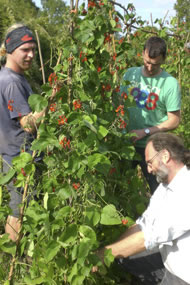The Japanese visionary and environmentalist Masanobu Fukuoka once stated that “the ultimate goal of farming is not the growing of crops, but the cultivation and perfection of human beings”. This sentiment is at the heart of ‘care farms’ which aim to combine care and meaningful work in the supportive natural environment of farms, woodlands and market gardens for some of society’s most vulnerable people. Care farming provides a healthy daily structure for the participant ‘farm helpers’, building confidence and supporting people to develop their social and practical skills.
Three fundamental ingredients make care farming so successful: the connection with Nature, the connection with other people and the connection with meaningful work and a healthy daily structure. People experiencing mental health issues or depression find themselves with negative thought spirals that engender low confidence and low self-esteem. Stepping out of their front door into the wider world is often challenging, but knowing that they are going to spend a day working in the natural environment with people who understand their difficulties can significantly support their healing process. Farm helpers do not feel they are ‘in therapy’ but rather they are simply making friends and doing something useful for society in the form of providing healthy, nutritious food.
Another group of farm helpers successfully using care farms are young people excluded from school. Around 10,000 students are excluded from school in England and Wales every year, yet many young people whom teachers felt were “unteachable” in the classroom become engaged and redirected through spending time on a care farm, finding that they can release their immense inner energy and creativity through their hands in practical ways.
It is interesting to see how the connection with something as simple as a daily structure can impact so positively. Take for example those experiencing substance misuse issues. Prior to engaging with care farming, this group of people tend to be physically active from mid-afternoon into the early hours, often intensely involved with acquisitive crime. The initial integration into the care-farming process focuses upon getting them out of bed in the morning and onto the farm. They become involved with the physical work of the farm, are given responsibility for looking after plants and animals and also get a good lunch sitting around a table eating together, which can be a new experience for some.
When they return home at night, they have the satisfaction of feeling they have done a decent day’s work and actually feel physically tired. The process builds and eventually they start to go to bed earlier. This simple habitual change has an enormous effect on their lives. It begins to reduce the connection to people and trigger-points that were helping to perpetuate and sustain their addictions. So in a completely practical form care farming focuses upon nurturing possibilities and provides the conditions for transformation to occur on a personal level.
Care farming also provides the conditions for a radical shift in the way we farm. Farmers who choose to care farm have to significantly adjust their working day to deliver the right opportunities for people to feel part of the farming process; this often entails a slowing down, with different, more traditionally labour-intensive practices being used. The farm usually employs extra people to achieve this and the farmer receives between £40 and £50 per person per day to cover staff costs, depending upon the needs and confidence of the group of farm helpers. Funding can come from social services, mental health teams, pupil referral units, probation, police or drug intervention teams. Initial evidence shows care farming to be very cost-effective in the long term as it appears to create sustained change. This significantly reduces the number of people returning to the various networks of the health, care, education and justice systems.
Care farming delivers local, social and health-care needs – sometimes termed ‘multifunctionality’ – as part of the working day. This can also translate to an economically sustainable model for low-carbon, locally available food production. Some care farms have gone a step further by branding the produce from their care farm, adding value at the farm gate and communicating to customers the social value of their products. Customer response has been very strong, with people preferring to buy into a system that provides community health needs as well as high-quality produce.
Another important bonus of care farming is that it can address the rural isolation of farming communities. A 200-acre farm can be tended by one farmer, alone nearly all of the working day. With this intense lone working, problems can become internalised and embedded, reflected in a high risk of suicide in the farming community. Care farming negates this lone working. Feedback from farmers who have moved into care farming has been fantastic. The enjoyment and enhanced meaning brought to their lives through delivering care on their own farms taps into the huge passion they have for sharing their skills and cultivating both the growth of plants and animals, and that of fellow human beings.
This is an innovative and cost-effective service that our current health and social care systems desperately need. Care farming is still embryonic in the UK, but it is set to spread rapidly. It is already a proven concept in the Netherlands, where over 1,000 care farms deliver substantial proportions of Dutch health and social care. If care farming grows in the UK at the same rate as it has in the Netherlands, the UK could have over 3,000 care farms in ten years’ time.







